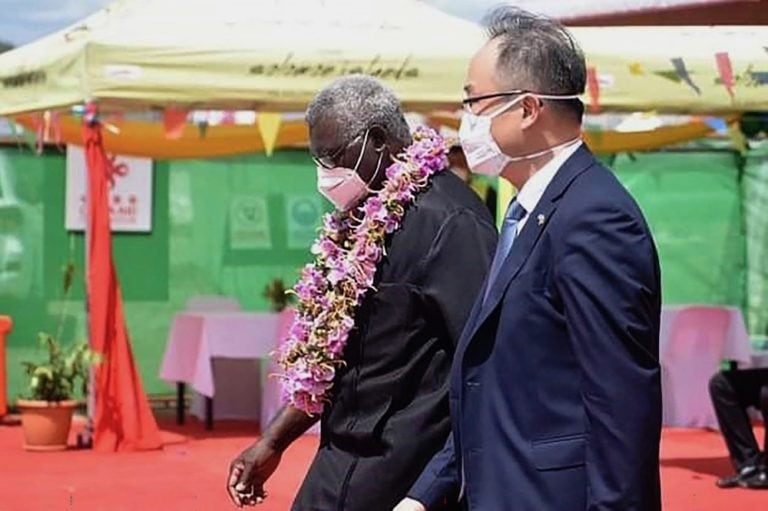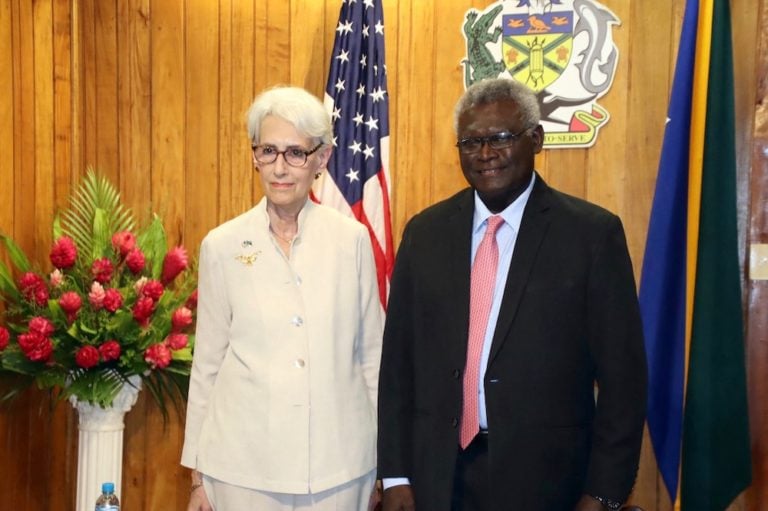PINA/IFEX) – On 31 January 2002, the PINA Secretariat wrote to recently elected Solomon Islands Prime Minister Sir Allan Kemakeza, urging him to urgently condemn and take action to stop intimidation of the country’s only daily newspaper, the “Solomon Star”. The PINA Secretariat in Suva, Fiji Islands, said that, according to its investigations, one of […]
PINA/IFEX) – On 31 January 2002, the PINA Secretariat wrote to recently elected Solomon Islands Prime Minister Sir Allan Kemakeza, urging him to urgently condemn and take action to stop intimidation of the country’s only daily newspaper, the “Solomon Star”. The PINA Secretariat in Suva, Fiji Islands, said that, according to its investigations, one of Kemakeza’s ministers and armed men supporting the minister threatened the newspaper and its staff and forced the newspaper to pay the minister “compensation”. The letter appealed to the prime minister to urgently ensure the newspaper and its staff are protected and able to continue to report and publish freely.
The PINA Secretariat letter stated that on 22 January, the “Solomon Star” carried a news report, an editorial and a letter to the editor about the minister allegedly assaulting a taxi driver at the Central Market in the capital, Honiara. The minister was alleged to have been drunk.
According to the PINA letter, on 24 January, a group of men, estimated to number eight, came to the “Solomon Star” office in Honiara’s Chinatown. They demanded Sol$5000 (approx. US$1000)
“compensation” for what the newspaper had published. According to information obtained by the PINA Secretariat, the men had guns in their vehicles. At least one is said to have carried a concealed weapon when he entered the newspaper office. The men reportedly said they were sent by the minister.
“Solomon Star” staff tried to explain why they published the articles, according to the PINA letter. But the men continued to demand the Sol$5000 “compensation”, the letter said. The “Solomon Star” staff asked if they could see the minister personally.
Publisher John Lamani and Associate Editor Ofani Eremae were escorted to meet the minister. But instead of being taken to the minister’s office, they were taken to an industrial area in suburban Honiara, the PINA letter said. The minister was there drinking with other men, according to the information obtained by PINA. He was reported to have said he was angry with the “Solomon Star” for publishing the articles, which he claimed were false and had embarrassed him as a government minister. He demanded that Sol$5000 be paid to him immediately as a form of compensation.
Because of the uncertain situation he and Eremae were in, Lamani paid the minister, the PINA letter said. Before Lamani and Eremae left, they were warned that if they published any more articles about the minister they would face trouble, according to PINA’s investigations.
The threats to the “Solomon Star” come amidst continuing law and order problems and some killings despite a peace agreement ending two years of deadly ethnic conflict. During the conflict, militia forces battled with high-powered weapons. The elected government was deposed in a June 2000 coup by one of the militia forces and elements of the paramilitary police. These forces took over the capital before handing back government to elected parliamentarians. Hundreds of weapons are reported to still be in the hands of former militia force members, despite an agreement the militia forces would disband and weapons be handed in. The “Solomon Star” incident came as two former militia hired as police special constables under the peace agreement were allegedly killed in Honiara by former militia from another ethnic group.
Background Information
During the October 2001 PINA convention in Madang, Papua New Guinea, “Solomon Star” publishers John and Cathy Lamani were presented with a special award for national media leadership throughout the Solomon Islands ethnic conflict. The citation said they maintained continued vigorous publication of the “Solomon Star” and helped provide stability while many other institutions of Solomon Islands society collapsed around them. The citation said they did so despite despite constant efforts to intimidate them. The staff of the state-owned Solomon Islands Broadcasting Corporation were similarly recognised by PINA for “true dedication to public service broadcasting … despite many and intense pressures on the corporation and the people who work for it”.
John Lamani, a former government journalist, founded the “Solomon Star” as an independent weekly after the end of the British colonial era in Solomon Islands. He and his wife Cathy Lamani have built the newspaper into the country’s main non-governmental news media.
In December 2001, a new Solomon Islands government was elected in the first general elections since the ethnic conflict. The elections were monitored by international observers and largely reported to be free and fair. The new coalition government led by Kemakeza includes some members with links to the former militia forces.
Recommended Action
Send appeals to the prime minister (who is also responsible for media and communications):
– calling on him to take urgent action to guarantee the safety of the “Solomon Star” and its staff, and to enable all Solomon Islands news media to continue to report, publish and broadcast freely and independently
Appeals To
Prime Minister Sir Allan Kemakeza
Office of the Prime Minister
Government of the Solomon Islands
P.O. Box G1
Honiara, Solomon Islands
Phone: +677 22 202
Fax: +677 25 470
Please copy appeals to the source if possible.


